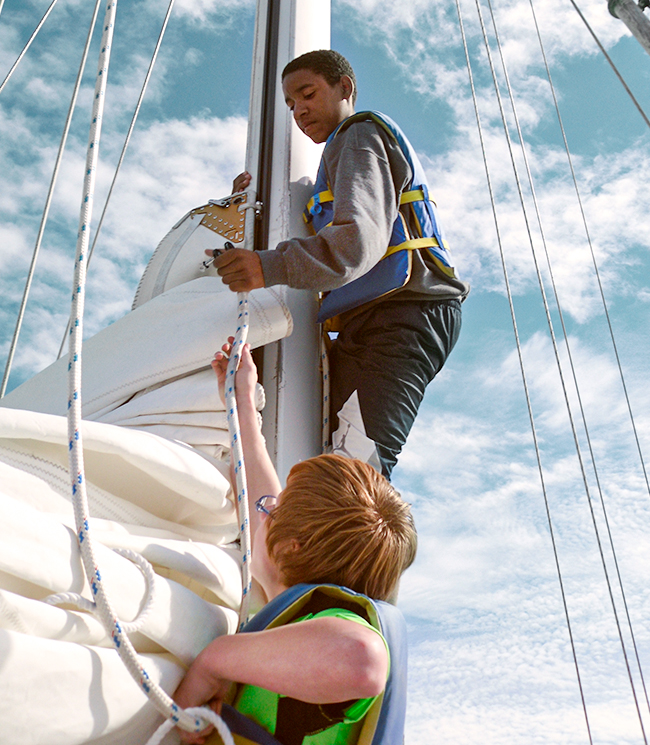A glimpse into the powerful project-based learning students will experience at south King County’s new Maritime High School starting this fall.
Stephanie Burns is an educator with 25 years of experience serving learners of all ages, backgrounds, and strengths. After working as the Director of Education for Salish Sea Expeditions for three years, Stephanie is now the Project Manager for the Duwamish Valley’s new Maritime High School.
Challenge Day had arrived! The sun was shining, with a light wind predicted from NNW. The challenge—thankfully—would not be the weather that fall day. But there would be challenges galore, no doubt, with memorable, meaningful learning to boot. Challenge Day is the final day of Salish Sea Expeditions’ multi-day overnight trips when the crew designs hands-on challenges for our students—it’s part science, part art, and full on fun, all while students use their insight, experience and strengths to solve various challenges.
Aside from it being my favorite day of our Salish Sea Expeditions SOUND Program, it also provides the culminating test for the week—not only for the students to demonstrate mastery of their navigation, sailing, and science knowledge, along with their communication, collaboration, and critical thinking skills, but also for our crew to observe firsthand how effective their instruction was across the week. Did we engage both the minds and hearts of our students? Did we support them appropriately to master the needed content and skill? We were about to find out.
On this Challenge Day, we let our student scientists and sailors choose their teams—asking them to reflect on what it means to be a leader, as well as consider what their own gifts and strengths were and how they could best support one another. There was one particular student who was adamant about serving only on the Navigation team, because that’s what he was most interested in. That Challenge Day did not disappoint—perhaps my favorite moment of the day was when that same student approached me and shared his observations that the Navigation team had it under control, but where he was really needed was on the Sailing team, as they needed extra hands if they were going to successfully and safely accomplish a maneuver.
“Have you discussed this with your Navigation team members?”
“Yes.”
“Ok. Sounds like you’re learning what it means to have an idea of what you want, but also recognize that there may be other community needs that exist as well. This is what leadership looks like, and feels like.’
You see, part of the message of boat-based expeditions is that when you’re part of a crew, you take care of your ship, shipmates and self, in that order. Not only had this newly initiated crew member heard that message, but he had applied it to his situation and made a difference for his fellow crewmates and ship. He was learning, but not before first making a mistake.
Those moments in learning are what I refer to as marvelous mistakes, because in my many years of making my own (marvelous) mistakes, and close to 25 years of encouraging students to learn from theirs, I’ve come to understand that learning from those mistakes is indeed what makes them marvelous. When a student makes a marvelous mistake and learns from it, we call that courage.
The most effective educators know that creating conditions that encourage and inspire learners to show up for who they are, celebrate their strengths and own their areas for growth is paramount, especially embracing our marvelous mistakes. Because mastering the art of showing up authentically (mistakes and all) gives permission for others in the room to do the same. When that happens, we’re capable of powerful collaboration, creativity, critical thinking, empathy, and beyond.
We also know that while skills and content are critical, building relationships and understanding who’s in your classroom—what their interests are, what jazzes them, what gives them hope and what inspires fear—all serve as the foundation for success. Understanding who our learners are and the conditions under which they learn best are key to educating and elevating those individuals.
So what do you get when you cultivate a culture that prioritizes relationships, demands true mastery of content and skills, and promotes authentic applications of that mastery beyond the four walls of the classroom? This convergence is known as project-based learning, and it’s the foundation for the Maritime High School, a partnership with Highline Public Schools, Duwamish River Cleanup Coalition, and Port of Seattle, launching this fall.
To learn more about enrollment in the Maritime High School, click here.
To learn how your investment can support the students of the Maritime High School, click here.

